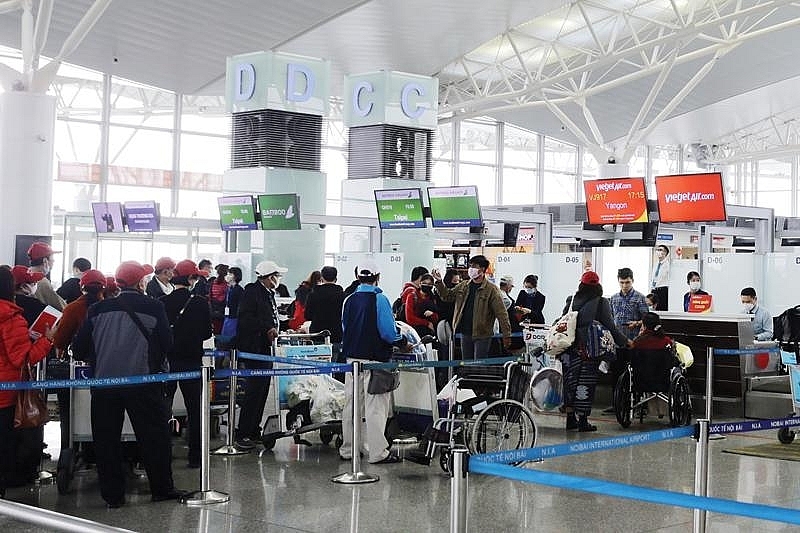 |
|
COVID-19 is leaving certain impacts on the economy, with travel and aviation industries not an exception
|
The impact of the COVID-19 health crisis on the economy is supposedly so severe that only in the first two weeks after its emergence, there were rumours that the State Bank of Vietnam (SBV) might be considering loosening its monetary policy to aid the situation.
To advocate this argument, the instances of China, the Philippines, and Thailand were taken as case studies leveraging media support. These assumptions, if not understanding their inner motives, might appear inaccurate.
Firstly, one should remember that just over a year after the US-China trade war broke out, leading to a sharp decline of the major economic indexes, central banks in many countries had taken action through interest rate cuts.
In their recent notices about monetary policies, all but one central bank mentioned COVID-19 as one of the biggest latent risks that must be kept under constant control.
Keeping tabs on the situation is important to be able to present remedy measures in time, yet monetary loosening might represent an extremely different story.
The implications by way of expansive approach might lead to not only inflation acceleration, but also causing injustice in liquidity access from the banking system.
Loosening basically means changing policy course. When a course is altered, it will naturally lead to changes to what was initially projected. The stock market, the interest rate, the exchange rate, and inflation expectations would also change. This might modify the development scenarios the government has outlined.
The US Federal Reserve’s latest note about monetary policy has taken the outbreak somewhat as a temporary shock not lasting long enough for it to change policy course. Unless there is sufficient evidence proving that the shock is big, its policy course will not shift or loosen.
Elsewhere, the Indian and New Zealand central banks have recently delivered similar messages, and they are consistently keeping stable interest rates.
In fact, some central banks have slashed their interest rates, but did the move come due to COVID-19? The central bank of the Philippines curtailed its basic interest rate by 0.25 per cent partly due to it, but mostly because they had raised the rate too strongly by 1.75 per cent in 2018.
In addition, the epidemic has resulted in a deep plunge in the volume of overseas remittance flows into the country. The recent interest rate cut was then considered a technical correction rather than an act of policy loosening.
The Central Bank of Thailand’s recent 0.25 per cent rate cut has its own story. For a long time, tourism has been a pillar of the Thai economy. COVID-19 has tremendous impacts on that economy, dampening growth perspectives. Furthermore, Thai people are facing one of the hardest-hit droughts of the past several decades. The recent rate cut could weaken the Thai baht, thus helping the country gain advantage in exports.
Singapore, having received a warning from the US for using the exchange rate for gaining an export advantage, has yet to take any action in terms of rate cut.
Meanwhile, the Chinese central bank often uses monetary tools to pump up liquidity and shore up the market rather than cutting rates. Lower interest rates would weaken the yuan, which would not be in favour of first-phase US-China trade deals. Pumping hundreds of billions of dollars into the economy recently, the Central Bank of China mainly aims to aid liquidity of the sectors hardest hit by the epidemic, and also to help mitigate the damage caused by the recent wave of corporate bond defaults in the country.
Generally, central banks so far are maintaining interest rates and assuming a wait-and-see approach towards the outbreak. The few central banks that have cut rates had their own reasons, with COVID-19 being a factor weighty enough to force them into action earlier than projected. An instant and rational measure at this point of time should only be supporting liquidity and rescheduling debts for the sectors severely hit by the epidemic.
Does Vietnam, which is viewed by the World Bank as a bright spot in a cloudy global landscape, need a change of course in monetary policy so soon after the COVID-19 outbreak?
The SBV is unlikely to cut the base interest rate as this could weaken the home currency. Augmenting the VND-USD exchange rate would expose Vietnam to the threat of being labelled as a currency manipulator – not wise in the context that Vietnam has made it on the watchlist for currency manipulation by the US Department of Treasury on May 2019.
In Vietnam, whenever the economy faces an impediment, loosening the monetary policies comes to mind as the first solution. Sometimes this comes attached with the words “with prudence” to alleviate the tension it might cause.
However, the watermelons and dragon fruit shipments waiting at the Chinese border would not get the green light immediately after central banks pumped more money into local banks.And as the central province of Khanh Hoa is facing remarkable losses due to a sharp decline in the number of Chinese visitors, bolstering liquidity in the financial system would be little help.
From a structural angle, loosening monetary policies would not help the country to export its agricultural products and reduce its heavy reliance on the Chinese market overnight.
Monetary loosening means using tools such as reducing interest rates, lowering compulsory reserves, or more drastic measures like massively pumping liquidity into the local financial system. This also signifies that the central bank will be approaching the economy on an expansive basis.
Along with this, loosened monetary policies would have mixed impacts across the board. The implications of such an expansive approach might lead not only to accelerating inflation but also to injustices in liquidity access from the banking system. On the one hand, some fields might easily benefit from banks’ ample liquidity while others, such as agriculture, might find it hard to access loans.
The difficulties that small- and medium-sized enterprises or small trading households face would multiply. The irrationality of a looser monetary policy might entail impartiality in income distribution, causing instability in the financial system, augmenting banking sector bad debts, and creating asset bubbles.
As the wrath of the COVID-19 is felt across sectors and segments, monetary policies should be exercised on a selective, but not expansive, basis. For instance, tourism and agriculture should be given priority for debt rescheduling and relevant fields to infrastructure investment should benefit from loosened conditions to facilitate the capital mobilisation process through bank loans or bond channels.
If monetary loosening could help economies become immune to the repercussions of COVID-19, central bank governors worldwide would deserve Nobel prizes. VIR
Tran Ngoc Tho

Travel agencies urged not to receive tourists from countries hit by COVID-19
The Vietnam Tourism Association (VITA) said yesterday that it has asked travel firms to stop receiving tourists from countries hit by COVID-19 in the face of new complicated development of the disease in South Korea and Japan.

Vietnam retailers striving to mitigate COVID-19 implications
Feeling the bite of the ongoing coronavirus (COVID-19) outbreak, many businesses in retail and services are coming up with measures to soften the blow.
 Tran Ngoc Tho, member of the National Advisory Council on Financial and Monetary Policies, digs into the implications of coronavirus.
Tran Ngoc Tho, member of the National Advisory Council on Financial and Monetary Policies, digs into the implications of coronavirus.